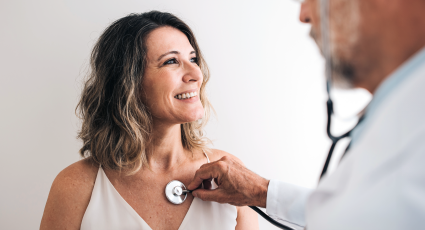Spread the word on strokes

Strokes are life-threatening medical emergencies. It happens when blood can’t reach your brain because of damage in blood vessels. Knowing what to do when someone’s having a stroke could make all the difference.
Strokes are life-threatening medical emergencies. It happens when blood can’t reach your brain because of damage in blood vessels. Knowing what to do when someone’s having a stroke could make all the difference.
Over 100,000 people have a stroke every year in the UK1 and someone sadly loses their life every 15 minutes1. But the resources in this field are advancing – there’s better awareness of symptoms, better emergency treatment and rehabilitation specialists. These improvements are building to a more optimistic future − there’s now 1.4 million stroke survivors in the UK today1.
Spot a stroke
There’s also some clear signs to look out for when spotting a stroke. It’s all about thinking FAST1. That’s short for Face, Arms, Speech and Time. If you think someone might be having a stroke, it’s important to check the following:
- Face: check their face and smile for any unevenness, drooping or numbness on one side
- Arms: see whether one arm is weak or numb. A helpful exercise can be asking them to raise both arms and looking whether one moved downwards
- Speech: listen to see if they’re having difficulty speaking − a simple phrase like ‘the sky is blue’ is a good way to check for any slurring
- Time: call 999 if you see any one of these signs. Every minute counts and the sooner someone gets help, the more likely they are to recover
Be aware
While a stroke can affect anyone, there’s some people who are at a higher risk than others. See if you, your family or friends fall into in any of the following groups2:
- Over 55
- Personal or family history of strokes or heart problems
- Smoking, drinking too much alcohol or not getting enough exercise
- Ethnically south Asian, African or Caribbean – these groups are more inclined to have high rates of diabetes and high blood pressure which increase chances of having a stroke
Getting help
While there’s no way to guarantee you’ll never have a stroke, there’s lots of organisations that offer specialist support − like the NHS or Stroke Association UK.
And (of course) healthy lifestyle choices work in your favour too. Aviva Smart Health* is here to help you with that – their experts can help you stay fighting fit through the right balance of nutrition and fitness. There’s also a 24/7 GP support to chat through your health. Or if you’re looking for a second medical opinion on any of your results, you’ll find an expert for that too.
Let’s spread awareness about strokes − so everyone’s prepared to help and act FAST.
1 Neurological conditions – Stroke, Brain Research UK, (last accessed 14/05/2024)
2 Stroke – Causes, NHS, September 2022 (last accessed 27/03/2024)
*Aviva Smart Health is provided to Aviva Protection UK Limited customers by Teladoc Health. This is not part of your insurance contract and can be changed or withdrawn at any time.